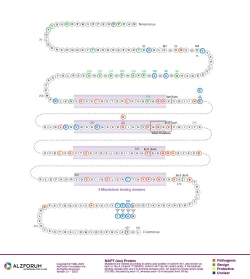Mutations
MAPT S285R
Quick Links
Overview
Pathogenicity: Frontotemporal Dementia : Unclear Pathogenicity, Progressive Supranuclear Palsy : Pathogenic
Clinical
Phenotype: Progressive Supranuclear Palsy
Reference Assembly: GRCh37/hg19
Position: Chr17:44087706 A>C
dbSNP ID: NA
Coding/Non-Coding: Coding
DNA
Change: Substitution
Expected RNA
Consequence: Splicing Alteration
Expected Protein
Consequence: Isoform Shift; Missense
Codon
Change: AGC to CGC
Reference
Isoform: Tau Isoform Tau-F (441 aa)
Genomic
Region: Exon 10
Findings
This mutation was detected in a Japanese man with probable progressive supranuclear palsy (Ogaki et al., 2012). He had no family history of neurodegenerative disease and his healthy parents did not carry the mutation. Satellite testing confirmed paternity, therefore the mutation most likely occurred de novo in this individual. Symptom onset occurred at age 46, starting with difficulty speaking and breathing. He later developed dementia and motor symptoms including limb bradykinesia, gait disturbance, and frequent falling. Abnormal eye movements were also prominent from early in the disease course. He died at age 48.
Neuropathology
Unknown.
Biological Effect
In vitro this missense mutation affects exon 10 splicing, resulting in the overproduction of tau isoforms containing four microtubule binding repeat domains (4R tau) (Ogaki et al., 2012).
Last Updated: 18 Mar 2024
References
Paper Citations
- Ogaki K, Li Y, Takanashi M, Ishikawa KI, Kobayashi T, Nonaka T, Hasegawa M, Kishi M, Yoshino H, Funayama M, Tsukamoto T, Shioya K, Yokochi M, Imai H, Sasaki R, Kokubo Y, Kuzuhara S, Motoi Y, Tomiyama H, Hattori N. Analyses of the MAPT, PGRN, and C9orf72 mutations in Japanese patients with FTLD, PSP, and CBS. Parkinsonism Relat Disord. 2012 Jul 18; PubMed.
Further Reading
Learn More
Protein Diagram
Primary Papers
- Ogaki K, Li Y, Takanashi M, Ishikawa KI, Kobayashi T, Nonaka T, Hasegawa M, Kishi M, Yoshino H, Funayama M, Tsukamoto T, Shioya K, Yokochi M, Imai H, Sasaki R, Kokubo Y, Kuzuhara S, Motoi Y, Tomiyama H, Hattori N. Analyses of the MAPT, PGRN, and C9orf72 mutations in Japanese patients with FTLD, PSP, and CBS. Parkinsonism Relat Disord. 2012 Jul 18; PubMed.
Disclaimer: Alzforum does not provide medical advice. The Content is for informational, educational, research and reference purposes only and is not intended to substitute for professional medical advice, diagnosis or treatment. Always seek advice from a qualified physician or health care professional about any medical concern, and do not disregard professional medical advice because of anything you may read on Alzforum.


Comments
No Available Comments
Make a Comment
To make a comment you must login or register.